‘No hope for a regime change’
R. Viswanathan, Distinguished Fellow, Latin America Studies, Gateway House, has been following the movements in Ukraine and Venezuela closely. In this interview, he explains the parallels and the impact on Venezuela
R. Viswanathan, Distinguished Fellow, Latin America Studies, Gateway House, has been following the movements in Ukraine and Venezuela closely. In this interview, he explains the parallels and the impact on Venezuela
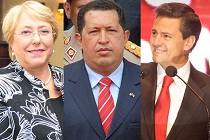 Courtesy: Wikimedia Commons
Courtesy: Wikimedia Commons
The death of Venezuelan President Hugo Chavez, election of President Michelle Bachelet in Chile, reforms in Mexico and the legalisation of cannabis in Uruguay have implications for the Latin American region. Gateway House examines how these will shape the region’s politics and economy in the coming years
 Courtesy: WikimediaCommons
Courtesy: WikimediaCommons
The return of the Left after four years, with the election this week of Michelle Bachelet as the president of Chile, will not mean any drastic change of direction. Chile has the most stable democracy and dynamic market in Latin America, and its Left can become a model for other countries, including India
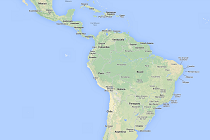 Courtesy:
Courtesy:
In 'Latin America Update' Gateway House lists some of the important events in Latin America over the past month
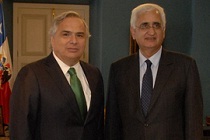 Courtesy: Ministry Of External Affairs, India
Courtesy: Ministry Of External Affairs, India
Indian Foreign Minister Salman Khurshid’s February 5 visit to Chile and Argentina is emblematic of the new era in Indo-Latin America relations. What does this increased engagement mean for India and Chile, two rapidly growing economies of the Global South?
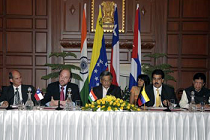 Courtesy: Embassy of India, Venezuela
Courtesy: Embassy of India, Venezuela
CELAC (Community of Latin American and Caribbean States) chose India as its first dialogue partner, expressing its intent to expand trade and diversify. Given the increased political will from both sides, can CELAC be the driver for India-Latin America relations or will bilateral ties maintain the status quo?
 Courtesy: Americas Quarterly
Courtesy: Americas Quarterly
Americas Quarterly published Gateway House's Hari Seshasayee's article on the India-CELAC relations. He examines whether given the increased political will from both sides, can CELAC be the driver for India-Latin America relations or will bilateral ties maintain the status quo?
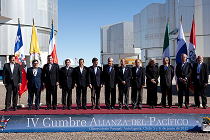 Courtesy: ESO/WikimediaCommons
Courtesy: ESO/WikimediaCommons
The newly-formed Pacific Alliance bloc seems more like a political club to counterbalance the Atlantic-facing, Brazil-led Mercosur group. However, the bloc accounts for 30% of India’s trade with Latin America. Can India engage the group so it is not left out from their Asia focus?

Amidst myriad country groupings that already exist – BRICS, IBSA, APEC, SCO and many others – a new initiative in the Pacific is looking to integrate more powerful countries to form a multilateral free trade agreement – the Trans Pacific Partnership. How important is this towards the reshaping of trade and power?